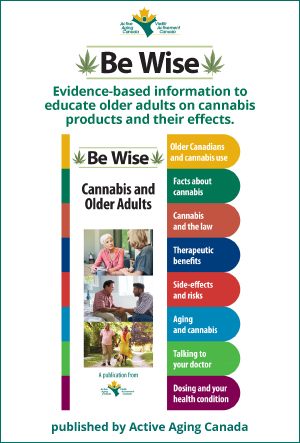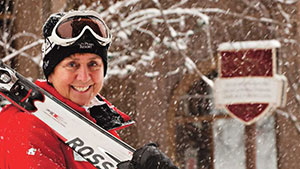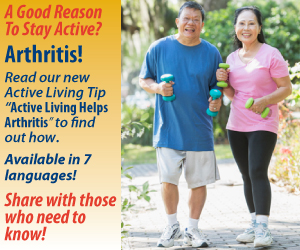Hot Weather Safety for Physical Activity
Vol.1, Issue 7, June 2021
Hotter weather has arrived in most parts of Canada. We look forward to this time of year, but too much heat is not good for anyone. It can be riskier as we get older. When we are active, our muscles produce heat. This causes a rise in body temperature.
Our bodies do two things to manage the increase in body heat:
- Our heart rate increases to help deliver blood to the surface of the skin for heat release.
- We start to sweat, which helps with cooling.
Both of these functions are reduced as we get older.1 That raises the risk of heat-related illness when we are physically active in the heat, either outdoors or in hot conditions indoors.1
Heat-related illness includes cramps, dizziness, edema (water retention and swelling) and exhaustion. There is also a more severe condition known as heat stroke.
Should we stop being active when it gets hot?
Older Canadians do tend to be less active when the weather gets hot and humid.2 But it is important to stay physically active all year round. In fact, older adults who are more physically fit can adapt better during exercise in the heat.3
Hot weather tips
- Older adults should refrain from strenuous physical activities in hot/humid conditions outdoors, particularly if they are not used to the conditions or are not used to being physically active.
- Take it easier when you exercise and be active during the cooler times of the day -- early morning or late evening, if you are not able to be active in an air-conditioned environment.
- Wear loose fitting, lightweight, moisture-wicking clothing. Cotton clothing can be cooler.
- Stay hydrated. As we get older, we do not notice thirst as much. That increases the risk for dehydration. Don’t wait until you feel thirsty. Drink lots of fluids, especially during exercise.
Learn more about staying healthy in the heat from Health Canada:
https://www.canada.ca/en/health-canada/services/publications/healthy-living/too-hot-protect-yourself-extreme-heat.html
https://www.canada.ca/fr/sante-canada/services/publications/vie-saine/trop-chaud-rotegez-vous-temps-chaud.html
Learn about symptoms and treatments of heat illness (English only):
https://www.acsm.org/docs/default-source/files-for-resource-library/exercising-hot-cold-environments.pdf?sfvrsn=1b06c972_4
If your home is cool inside, here are some exercise video options for hot days:
https://www.activeagingcanada.ca/participants/get-active/healthy-living/active--aging-at-home.htm
https://www.activeagingcanada.ca/fr/participants/soyez-actifs-et-actives/vie-saine/vieillir-activement-chez-soi.htm
References:
- Balmain et al. Aging and Thermoregulatory Control: The Clinical Implications of Exercising under Heat Stress in Older Individuals. Biomed Res Int. 2018: 8306154. 2018.
- Brandon et al. Physical activity levels of older community-dwelling adults are influenced by summer weather variables. Appl. Physiol. Nutr. Metab.34: 182–190. 2009.
- Kenney et al. Temperature regulation during exercise in the heat: Insights for the aging athlete. Journal of Science and Medicine in Sport. 2020.
Liza Stathokostas, PhD
Research Director
Active Aging Canada









